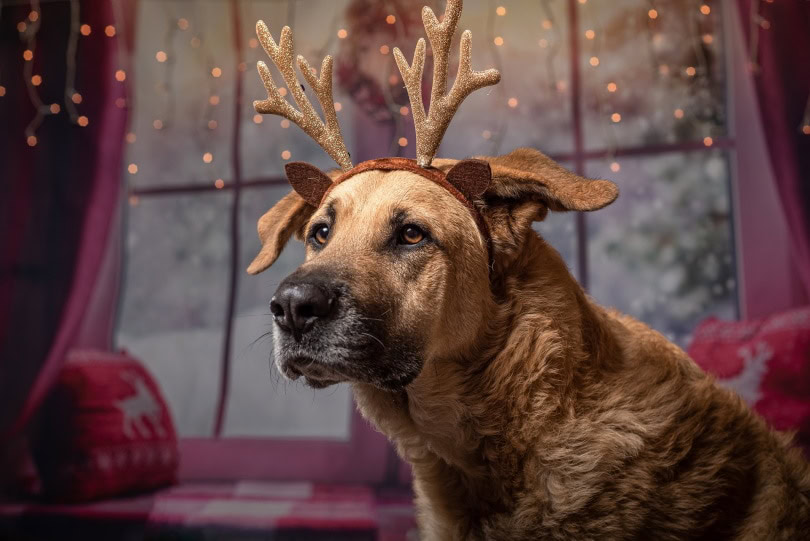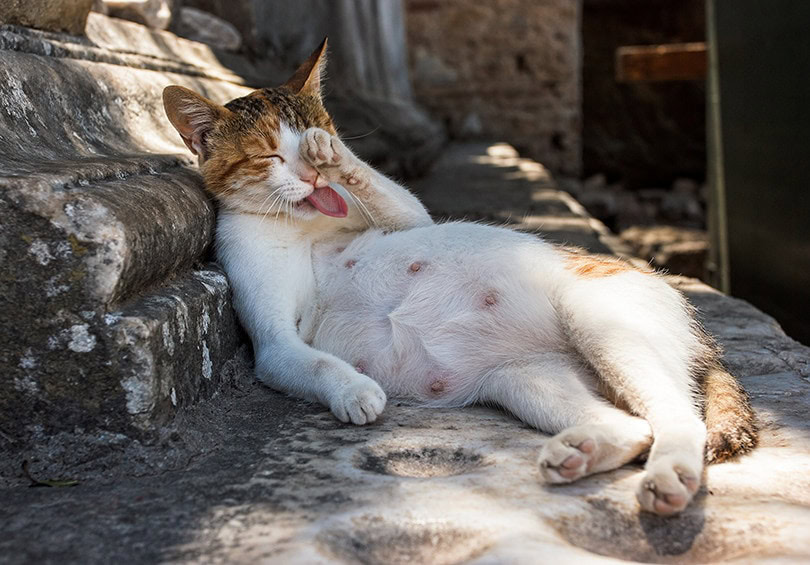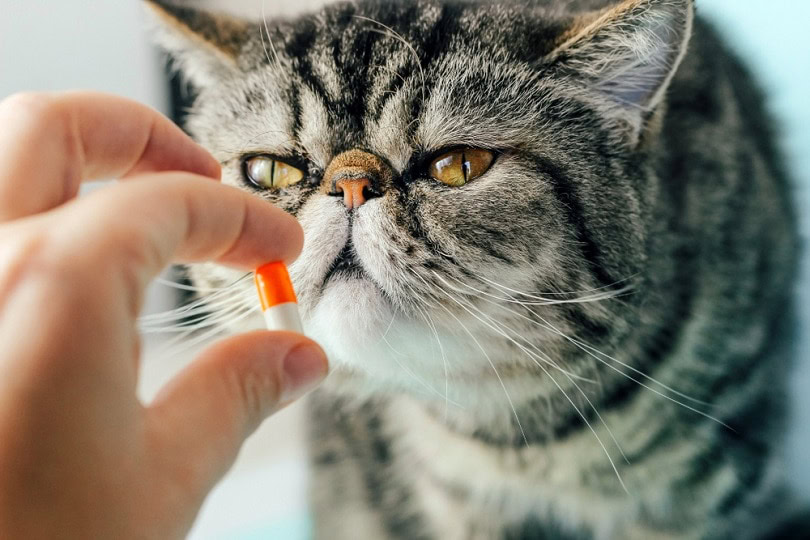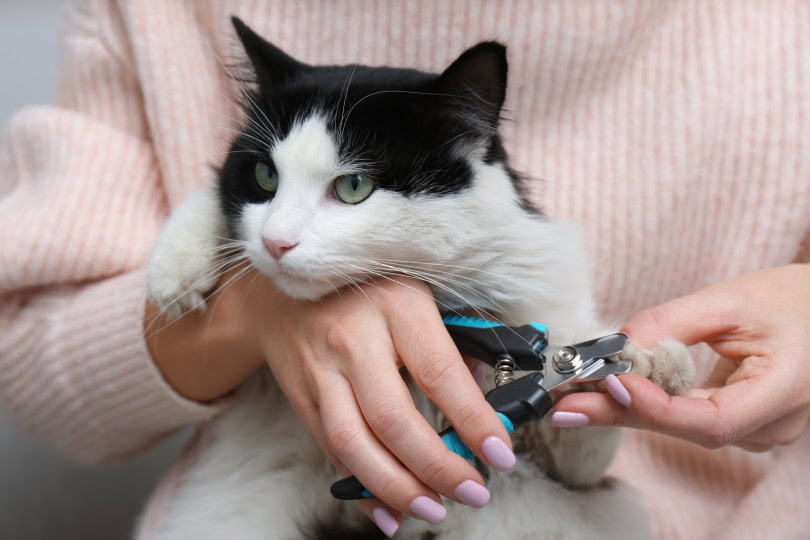VET APPROVED

The information is current and up-to-date in accordance with the latest veterinarian research.
Learn more »Christmas is a joyful time that is often shared with loved ones, pets included. That said, it isn’t always the safest time of year for your dog. There are lots of hazards associated with Christmastime that can hurt your pup, so it’s important to be mindful of these dangers and keep your house safe for the furry members of your family.

The 13 Tips for a Dog-Friendly Christmas
1. Set Ground Rules
During the holidays, you’ll likely have visitors in your house, not to mention all of the foods, plants, and decorations that aren’t the norm throughout the year. There are a lot of hazards for your dog during this time, so it’s imperative to set solid ground rules for everyone who will be around your pet. This can be visitors to your home, members of your household, or people you’ll be visiting with your dog.
Everyone needs clear rules regarding what can and cannot be fed to your dog. You also need to make sure everybody understands the décor that can be risky for your pet and commit to keeping those items out of reach or not using them at all.
There should also be set rules about when and how your dog goes outside. If your pet is a digger or fence jumper, everyone needs to know the risks of letting your dog out unattended. Some dogs may only need to be taken outside on a leash and attended by an adult. No matter what, an adult should always know where your pet is and ensure that they are safe.
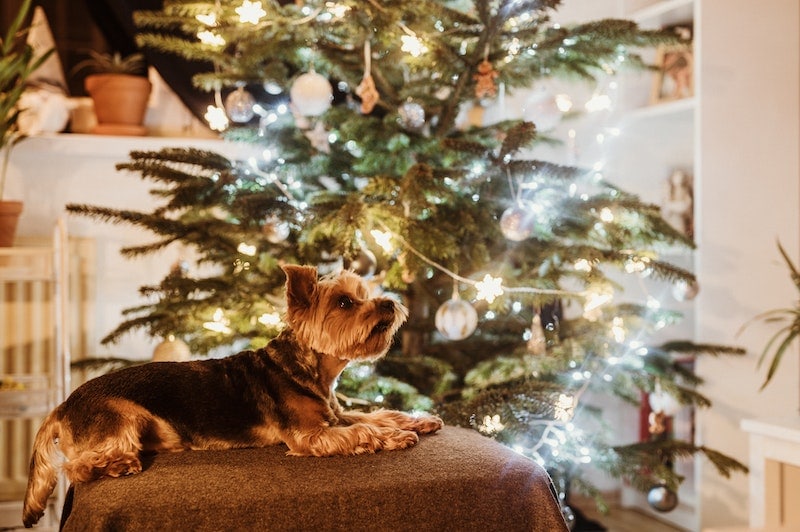
2. Unplug
There are a lot of electrical hazards for your dog during the holidays, and sometimes, these electrical items can be “too good to be ignored” for a curious pup. Electrical cords for things like Christmas lights and electronic décor can pose chewing, ingestion, or electrocution hazards for some dogs. Fire hazards also increase during the holidays due to the number of items that are left plugged in and turned on all the time.
Make it a point to keep things unplugged when they aren’t actively being used. This means unplugging your tree when nobody will be home to enjoy it, along with other electronics. If your dog is a chewer, you may consider using bitter apple spray or some other deterrent on your electrical cords to discourage chewing.
3. Avoid Open Flames
Around the holidays, there are often a lot of open flames in use, including candles and fireplaces. Both of these things can pose serious risks to your dog and your home. If you are going to be directly supervising your dog, candles can be safe to use, but it’s best to keep them high enough that your dog can’t purposely or accidentally get to them or knock them over.
Fireplaces are a good way to warm your home without using electricity, but they can be dangerous, especially if left burning while unattended. They not only pose a fire hazard but also a carbon monoxide risk, so it’s important to make sure your smoke and carbon monoxide detectors have good batteries and are functioning properly.
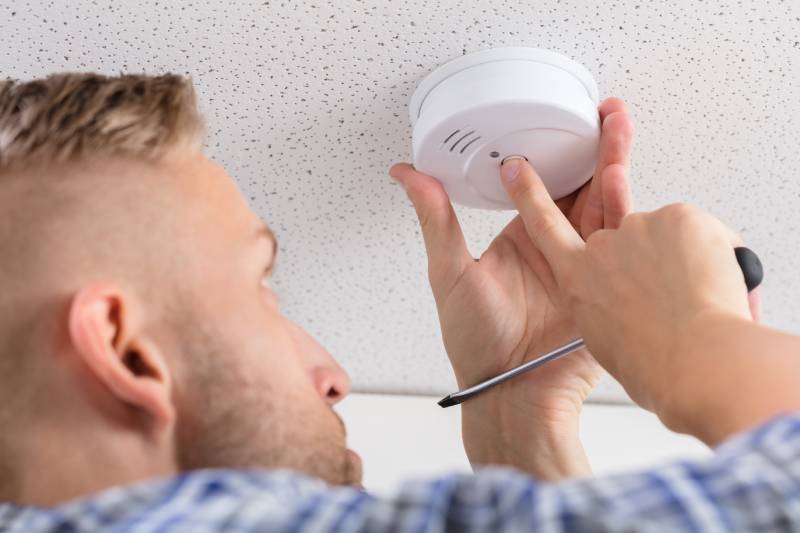
4. Be Mindful of Scents
There are some scents that can be irritating to the respiratory tract of your pets, including dogs, so it’s important to be aware of these scents and avoid using them. Most essential oil products are not recommended for use in homes with pets, so be aware of plug-ins, wax melts, and diffusers.
The most dangerous essential oils for dogs include cinnamon, citrus, peppermint, pine, sweet birch, and wintergreen, all of which are associated with the holiday season. Other common essential oils that are dangerous for dogs include ylang-ylang, tea tree, and pennyroyal.
5. Keep Glass Out of Reach
At Christmastime, there is often a lot of glass around. For example, many ornaments, décor items, and Christmas tree lights are made of glass. While glass poses obvious risks to paws and snouts if broken, it can also be extremely dangerous if consumed.
It’s not uncommon for dogs to chew on ornaments and Christmas lights, sometimes even consuming glass objects whole that can then break inside of the body. In homes with dogs, sometimes it is safest to avoid the use of glass ornaments and to keep all glass décor well out of reach.
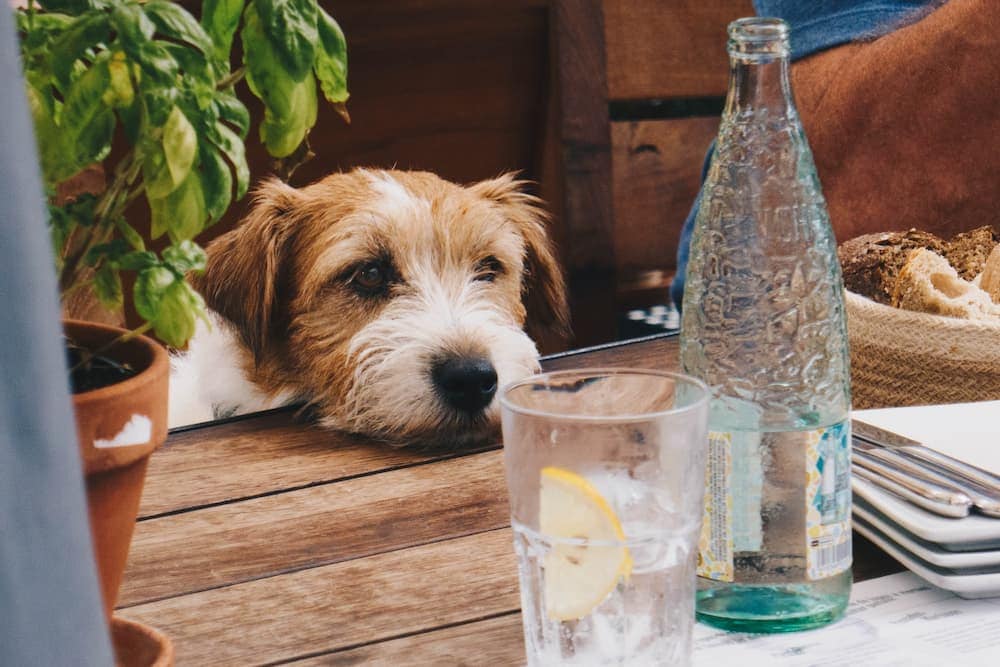
6. Limit Tinsel and Ribbon Use
Tinsel and ribbon are both products that are common around Christmastime, but they may not be present in your home during the rest of the year. These items are exceptionally dangerous to dogs, especially if consumed.
There is a risk of your dog getting tinsel or ribbon wrapped around their neck and choking or injuring themselves, and if consumed, these items can lead to choking or a foreign object situation that could cause them to need emergency surgery or to suffer a fatal outcome.
When consumed, long, stringy objects like ribbon and tinsel can become wrapped around the intestines as they pass through, leading to the intestines “telescoping” through themselves (intussusception) and even causing tissue death. If your dog has consumed something like this, they need to immediately be seen by the vet to determine if it can be removed before it leaves the stomach.
If you notice your dog has a ribbon, tinsel, or another string-like object coming from their bottom after trying to poop, do not attempt to pull it out. If it’s wrapped around the intestines, you can do far more harm than good. Always consult with your vet if you see this.
7. Avoid Dangerous Plants
There are a few plants that are commonly seen as decorations and gifts around the holidays, including poinsettia, mistletoe, balsam fir, pine, holly, cedar, and amaryllis. These plants are all toxic to pets to some degree, from irritating to deadly.
It’s generally advised to avoid putting these plants in homes with pets entirely, but if you do choose to bring them into your home during the holidays, always keep them out of the reach of your dog.
Christmas trees in particular can be a major temptation for dogs, so always keep your pet and tree separate from each other, whether it’s by putting them in separate rooms or setting up a barrier, like a baby gate, around your tree.
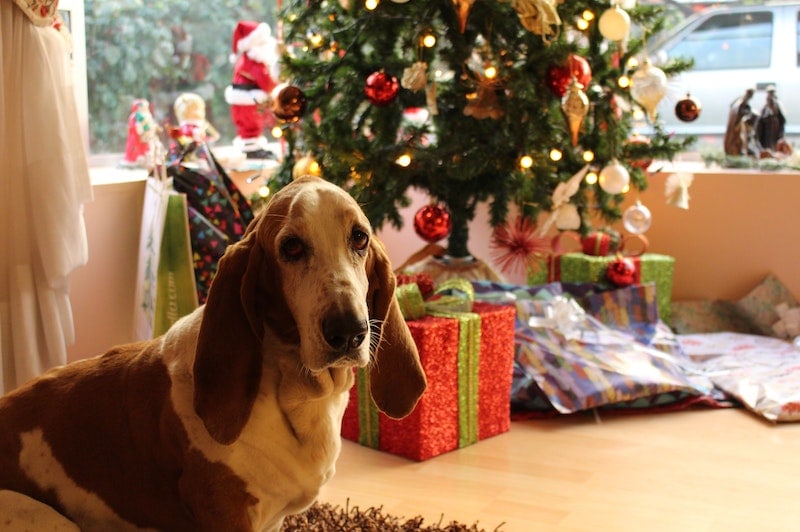
8. Don’t Allow Dogs to Drink the Tree Water
There are items that are added to the water for live Christmas trees in order to keep them alive throughout the entire season. These products can pose health hazards to your dog, not to mention that many Christmas tree species can also be dangerous for your pet, so it’s necessary to keep your dog from drinking the water intended for the Christmas tree.
If you’ve added anything to the water, like sugar, aspirin, or plant food, you should contact your dog’s vet if they get into it.
9. Gifts Are a Hazard
Remember when you were a kid and you were so excited to see the gifts under the tree in the days or weeks leading up to Christmas? Your dog is excited to see these unusual items too! However, there are many presents given at Christmastime that can be hazardous to canines, such as meats and cheeses, alcohol, and chocolate.
Some curious dogs may also experience serious issues if they consume parts of gifts, like pieces of ribbon or fabric. Even if your dog isn’t typically the type to get into unusual objects, it’s best to keep Christmas presents out of reach throughout the season to keep your dog safe and healthy.
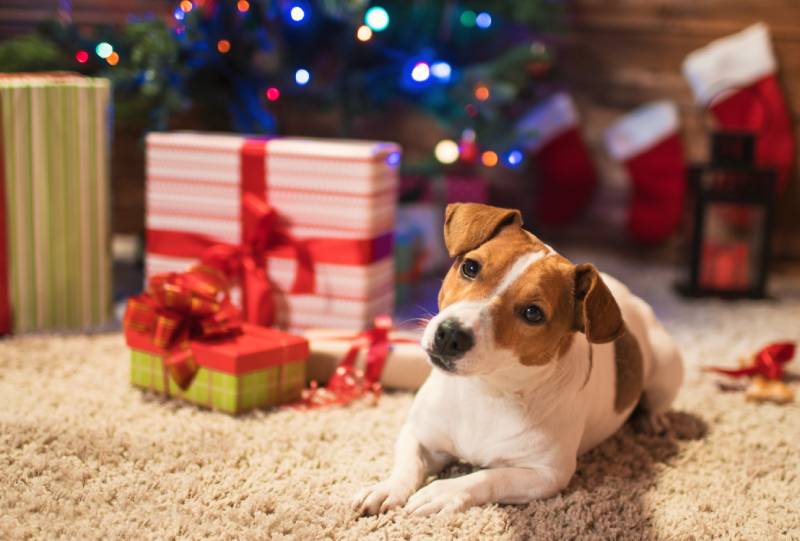
10. Don’t Share Table Scraps
Holiday foods are often rich, fatty, and heavy foods that aren’t exactly great for us to eat all the time. For your dog, though, they can be downright dangerous. Things like chocolate and alcohol are toxic to canines, while sugary foods can cause stomach upset, and fatty foods can lead to pancreatitis. Things like turkey and ham bones can lead to intestinal obstructions or perforations, putting your dog’s health and life at risk. Never give a cooked bone to your pet.
It’s important to avoid giving your dog table scraps during the holidays, and this should be a ground rule for the visitors in the home too. If you want to give your dog something special to eat, make sure to choose foods that are unseasoned and baked or boiled without added fats. Unseasoned baked turkey and chicken in small quantities can be safe for dogs, along with sweet potatoes, green beans, and apples. Keep in mind, though, that these should be considered treats and fed in very small quantities.
11. Take Out the Trash
There are a lot of things that go into the trash during Christmastime, including food scraps, ribbon and wrapping paper, packaging, and dead or dying plants. All of these things have already been mentioned as risky for your dog, and the trash is often an easy-access option for your pet to get to the things you’re otherwise doing a great job of keeping out of reach.
Make sure to always keep your dog away from the trash, and if you’re unable to do this with certainty, the trash needs to go out frequently or be moved to a room where they can’t access it. Dog-safe bins, crates, and baby gates are good options for keeping your pet out of the trash, but the most reliable method is just to keep it empty.
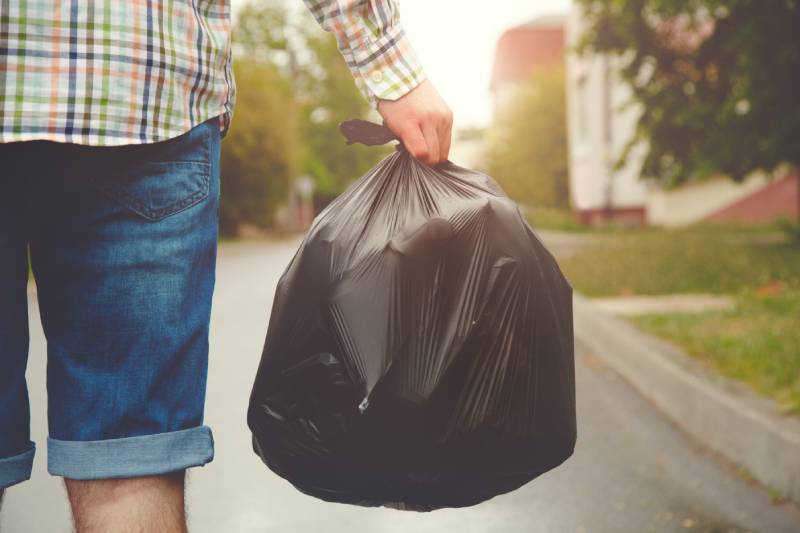
12. Be Cautious While Traveling
Traveling during the holidays can be full of stress for all involved, especially for pets. If you’re traveling with your dog during this time, you should be prepared for all possibilities. Make sure your pet is always leashed and attended by an adult anytime they are outside of the car or place where you’re staying. Even the most well-behaved dogs may become nervous in unfamiliar situations, so it’s not uncommon for pets to get loose and go missing during travel.
Keep your dog’s collar tags updated with current information, and ensure that you have a copy of your pet’s pertinent medical information with you during traveling, including current medical diagnoses, medications, and vaccines. Also, work to familiarize yourself with the laws pertaining to traveling with animals in the area you’ll be going to or with the airline you’ll be traveling with.
13. Be Prepared
There are a lot of things that can go wrong during the holidays, especially when pets are involved. You need to be prepared for anything that could occur during the season.
Keep a list of important phone numbers on hand, especially for your local vet and emergency vet. It’s also a good idea to check the holiday hours of the veterinary care in your area so you’ll know where to go in case of a problem.
Ensure that all identification and records are up to date, and make sure to decorate with the intention of keeping your pet safe. Get the whole family and visitors on board with helping to keep your dog safe throughout the Christmas season.
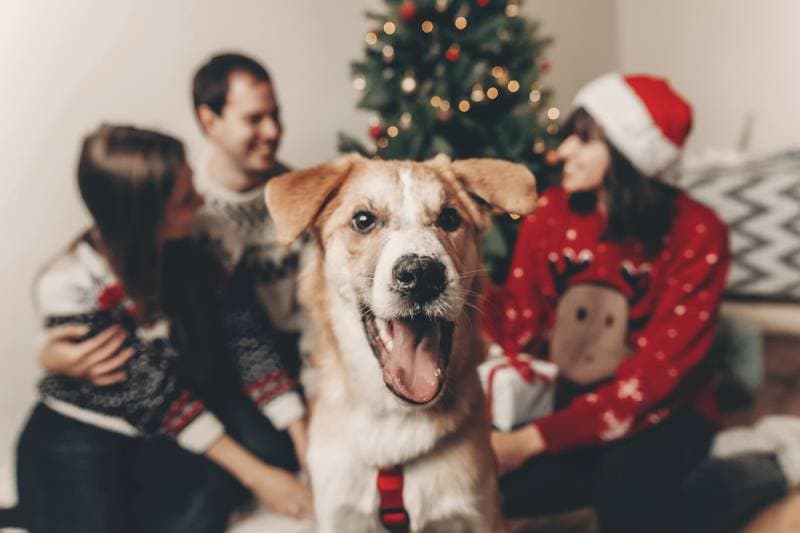

Conclusion
The holidays are an exciting time that is usually busy and can become overwhelming. Make sure to prepare and familiarize yourself with the risks to your dog during this season. By being informed, preparing well in advance, and preventing dangerous scenarios, you’ll help keep your dog safe and healthy and make the holiday season more enjoyable for everyone.
Featured Image Credit: Sven Lachmann, Pixabay
Contents
- The 13 Tips for a Dog-Friendly Christmas
- 1. Set Ground Rules
- 2. Unplug
- 3. Avoid Open Flames
- 4. Be Mindful of Scents
- 5. Keep Glass Out of Reach
- 6. Limit Tinsel and Ribbon Use
- 7. Avoid Dangerous Plants
- 8. Don’t Allow Dogs to Drink the Tree Water
- 9. Gifts Are a Hazard
- 10. Don’t Share Table Scraps
- 11. Take Out the Trash
- 12. Be Cautious While Traveling
- 13. Be Prepared
- Conclusion
